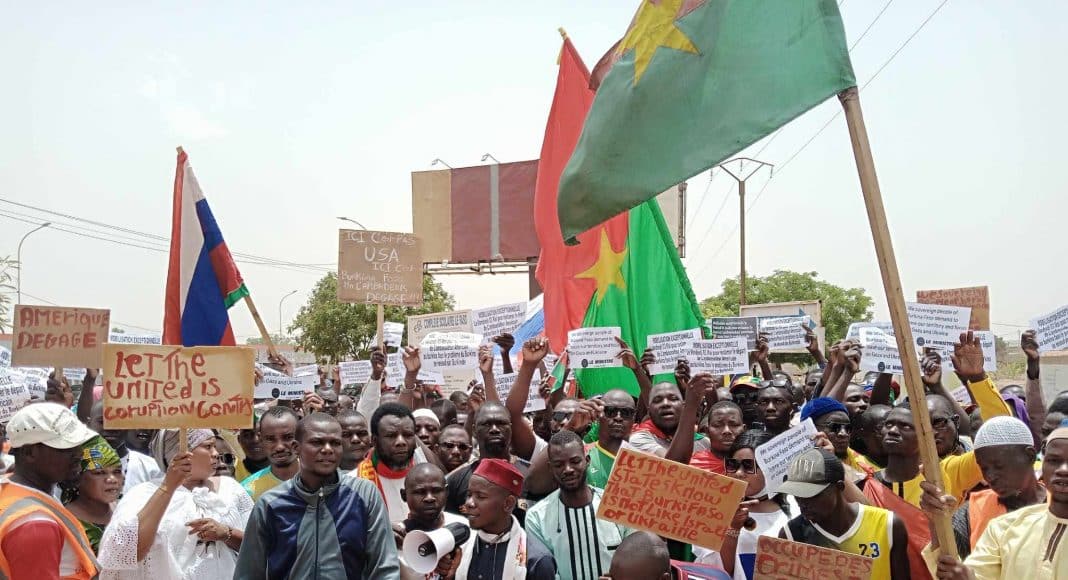After removing corrupt leaders and driving out foreign troops in a string of popular coups d’etat, West African states are taking back control of their mineral resources in a further blow to their former French imperialist masters. Niger reclaimed its largest uranium mine, revoking French company Orano’s licence in June. Mali has increased state control over mineral companies after creating a state gold mining company in 2022. Burkina Faso nationalised two gold mines on 26 August, previously owned by London-based Endeavour Mining, and the state plans to open a gold refinery by year’s end. This reassertion of sovereignty has been met with imperialist aggression in the form of Ukrainian-backed rebels. Burkina Faso suffered its worst-ever terrorist attack on 24 August in the northern town of Barsalogho, killing up to 400 people and injuring a further 200 as NATO opens a new front in its proxy war with Russia. Cassius J Kalany reports.
The Alliance des États du Sahel (Alliance of Sahel States, AES) is a confederation of Burkina Faso, Mali and Niger established on 6 July 2024, following military coups in 2022, 2021 and 2023 respectively. The previous leaders aligned with French imperialist interests and failed to combat the region’s ongoing jihadist insurgency. The confederation developed from a mutual defence pact created on 16 September 2023 in response to aggression from the Western-aligned Economic Community of West African States (ECOWAS/CEDEAO) and the jihadists (see ‘Niger Coup: French imperialism in crisis’, FRFI 296 October/November). The 24 August terrorist attack in Burkina Faso was claimed by Jama’at Nusrat al-Islam wal-Muslimin (JNIM), a coalition of groups based in Mali with links to Al-Qaeda. The government had instructed soldiers and civilians to dig trenches around the village three days earlier. JNIM gunned down soldiers and civilians who were trench-digging or in the vicinity. The last military force between the capital Ouagadougou and the encroaching JNIM forces is stationed in Barsalogho.
NATO’s destruction of Muammar Gaddafi’s Libya in 2011 and French ‘anti-jihadist’ military interventions in the 2010s backed by the US, EU and Britain, destabilised the Sahel, encouraging separatist movements that seek to establish an autonomous state, like the short-lived state of ‘Azawad’ in northern Mali, and driving moderate and progressive groups towards reactionary politics. Islamic fundamentalist and separatist alliances rapidly formed such as JNIM and the ‘Coordination of Azawad Movements’ (CMA). These groups now control almost 50% of Burkina Faso and huge swathes of Mali and Niger.
Ukraine: proxy of western imperialism in Africa
The AES has turned to China and Russia, having expelled Western troops (see ‘West Africa resists imperialism’, FRFI 300 June/July 2024). Chinese arms manufacturer Norinco sent 90 armoured vehicles to Burkina Faso in June this year and signed a military equipment deal with Mali in August. Russia’s mercenary Wagner Group, also referred to as ‘Africa Corps’ while in Africa, has been deployed since December 2021 in Mali, August 2023 in Niger, and in Burkina Faso this year. Russia has provided military equipment and instructors and is building an air defence system for Niger. In response Ukraine, acting as a proxy on behalf of NATO, has provided military training, equipment and logistical information to rebels in the Sahel area. Russian media outlet Sputnik claimed in August 2023 that MI6 had made preparations for a unit of 100 Ukrainian fighters to be sent to Africa to carry out sabotage operations against Russia-linked targets.
In July this year an ambush in Tinzaouatène, in northeastern Mali, by the rebel group ‘Strategic Framework for the Defence of the People of Azawad’, a CMA splinter group, killed scores of Malian and Wagner forces. Andriy Yusov, Ukrainian Defence Ministry’s Intelligence Services spokesman, confirmed that the rebels ‘received necessary information, and not only information, which allowed them to carry out a successful military operation against Russian war criminals.’ A Ukrainian drone was also found at the scene. Yusov promised ‘You will see more of this in the future.’
Senegal’s Ukrainian embassy posted a video celebrating this attack, leading to Mali and Niger severing diplomatic ties with Ukraine, and even ECOWAS condemning foreign interference. Ukraine’s then Minister of Foreign Affairs, Dmytro Kouleba, explained to Africanews: ‘Our strategy is not to replace Russia but to free Africa from Russia’s grip.’ Groups such as Planet of Young Pan-Africanists denounced Ukraine’s intervention, declaring ‘The AES countries are victims of attacks by NATO international terrorism in Tinzaouatène.’ On 19 August the AES leaders issued a joint statement to the UN Security Council, petitioning its president to denounce Ukraine’s ‘open and assumed support for international terrorism’, only days before the Barsalogho attack.
The struggle for unity
The AES leadership largely comprises a nationalistic petit-bourgeois class, espousing ideals of anti-imperialism and self-determination, particularly in Burkina Faso, whose interim leader Ibrahim Traoré and Prime Minister Kyélem de Tambèla have Marxist backgrounds and a professed admiration for the late revolutionary communist leader Thomas Sankara. After decades of exploitation under French imperialism, the masses have welcomed these new leaders responding to their urgent demands. Burkina Faso’s Citizen’s Nightwatch, the ‘Wayiyans’, spontaneously formed in September last year during the first of five thwarted coup attempts against Traoré. They keep watch 24/7 across all 8,000 villages, likening themselves to the ‘Committees for the Defence of the Revolution’ (CDRs) under Sankara, which themselves were inspired by the revolutionary Cuban CDRs.
In Niger, there is overwhelming support for leader Abdourahamane Tchiani and his government, from women’s organisations, political parties and trade unions such as the Marxist ‘Union of Nigerien Scholars’. Mali’s interim leader Assimi Goïta, president of the AES, has introduced the Inter-Malian Dialogue for Peace and National Reconciliation, a national, participatory, democratic process that consults all sections of Malian society, that formulates concrete recommendations for the transitional government.
For the masses of the AES, the consensus is for the continuation of the military administrations and their transitional governments to protect their countries’ resources and sovereignty from Western imperialism.
Hands off the Sahel!
Imperialism out of Africa!
FIGHT RACISM! FIGHT IMPERIALISM! 302 October/November 2024




